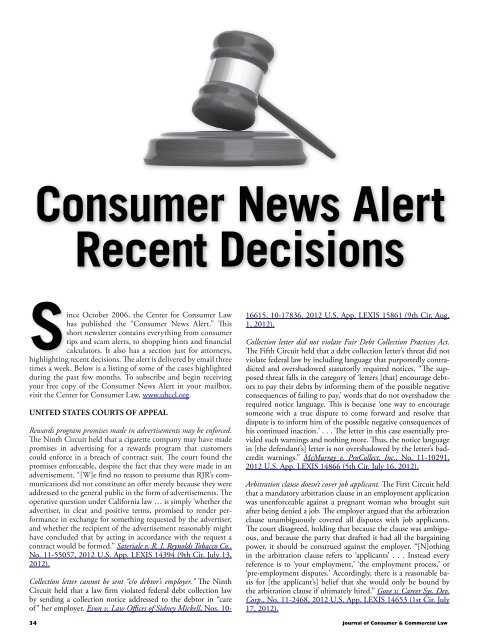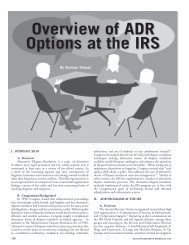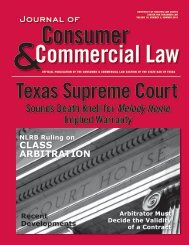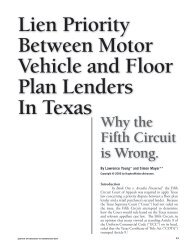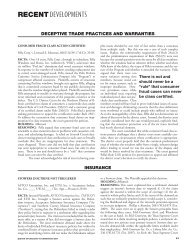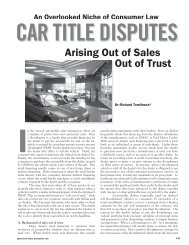Teaching Consumer Credit Law in an Evolving Australian Economy
Teaching Consumer Credit Law in an Evolving Australian Economy
Teaching Consumer Credit Law in an Evolving Australian Economy
Create successful ePaper yourself
Turn your PDF publications into a flip-book with our unique Google optimized e-Paper software.
<strong>Consumer</strong> News Alert<br />
Recent Decisions<br />
S<strong>in</strong>ce October 2006, the Center for <strong>Consumer</strong> <strong>Law</strong><br />
has published the “<strong>Consumer</strong> News Alert.” This<br />
short newsletter conta<strong>in</strong>s everyth<strong>in</strong>g from consumer<br />
tips <strong>an</strong>d scam alerts, to shopp<strong>in</strong>g h<strong>in</strong>ts <strong>an</strong>d f<strong>in</strong><strong>an</strong>cial<br />
calculators. It also has a section just for attorneys,<br />
highlight<strong>in</strong>g recent decisions. The alert is delivered by email three<br />
times a week. Below is a list<strong>in</strong>g of some of the cases highlighted<br />
dur<strong>in</strong>g the past few months. To subscribe <strong>an</strong>d beg<strong>in</strong> receiv<strong>in</strong>g<br />
your free copy of the <strong>Consumer</strong> News Alert <strong>in</strong> your mailbox,<br />
visit the Center for <strong>Consumer</strong> <strong>Law</strong>, www.uhccl.org.<br />
UNITED STATES COURTS OF APPEAL<br />
Rewards program promises made <strong>in</strong> advertisements may be enforced.<br />
The N<strong>in</strong>th Circuit held that a cigarette comp<strong>an</strong>y may have made<br />
promises <strong>in</strong> advertis<strong>in</strong>g for a rewards program that customers<br />
could enforce <strong>in</strong> a breach of contract suit. The court found the<br />
promises enforceable, despite the fact that they were made <strong>in</strong> <strong>an</strong><br />
advertisement. “[W]e f<strong>in</strong>d no reason to presume that RJR’s communications<br />
did not constitute <strong>an</strong> offer merely because they were<br />
addressed to the general public <strong>in</strong> the form of advertisements. The<br />
operative question under California law … is simply ‘whether the<br />
advertiser, <strong>in</strong> clear <strong>an</strong>d positive terms, promised to render perform<strong>an</strong>ce<br />
<strong>in</strong> exch<strong>an</strong>ge for someth<strong>in</strong>g requested by the advertiser,<br />
<strong>an</strong>d whether the recipient of the advertisement reasonably might<br />
have concluded that by act<strong>in</strong>g <strong>in</strong> accord<strong>an</strong>ce with the request a<br />
contract would be formed.” Sateriale v. R. J. Reynolds Tobacco Co.,<br />
No. 11-55057, 2012 U.S. App. LEXIS 14394 (9th Cir. July 13,<br />
2012).<br />
Collection letter c<strong>an</strong>not be sent “c/o debtor’s employer.” The N<strong>in</strong>th<br />
Circuit held that a law firm violated federal debt collection law<br />
by send<strong>in</strong>g a collection notice addressed to the debtor <strong>in</strong> “care<br />
of” her employer. Evon v. <strong>Law</strong> Offices of Sidney Mickell, Nos. 10-<br />
16615, 10-17836, 2012 U.S. App. LEXIS 15861 (9th Cir. Aug.<br />
1, 2012).<br />
Collection letter did not violate Fair Debt Collection Practices Act.<br />
The Fifth Circuit held that a debt collection letter’s threat did not<br />
violate federal law by <strong>in</strong>clud<strong>in</strong>g l<strong>an</strong>guage that purportedly contradicted<br />
<strong>an</strong>d overshadowed statutorily required notices. “The supposed<br />
threat falls <strong>in</strong> the category of ‘letters [that] encourage debtors<br />
to pay their debts by <strong>in</strong>form<strong>in</strong>g them of the possible negative<br />
consequences of fail<strong>in</strong>g to pay,’ words that do not overshadow the<br />
required notice l<strong>an</strong>guage. This is because ‘one way to encourage<br />
someone with a true dispute to come forward <strong>an</strong>d resolve that<br />
dispute is to <strong>in</strong>form him of the possible negative consequences of<br />
his cont<strong>in</strong>ued <strong>in</strong>action.’ . . . The letter <strong>in</strong> this case essentially provided<br />
such warn<strong>in</strong>gs <strong>an</strong>d noth<strong>in</strong>g more. Thus, the notice l<strong>an</strong>guage<br />
<strong>in</strong> [the defend<strong>an</strong>t’s] letter is not overshadowed by the letter’s badcredit<br />
warn<strong>in</strong>gs.” McMurray v. ProCollect, Inc., No. 11-10291,<br />
2012 U.S. App. LEXIS 14866 (5th Cir. July 16, 2012).<br />
Arbitration clause doesn’t cover job applic<strong>an</strong>t. The First Circuit held<br />
that a m<strong>an</strong>datory arbitration clause <strong>in</strong> <strong>an</strong> employment application<br />
was unenforceable aga<strong>in</strong>st a pregn<strong>an</strong>t wom<strong>an</strong> who brought suit<br />
after be<strong>in</strong>g denied a job. The employer argued that the arbitration<br />
clause unambiguously covered all disputes with job applic<strong>an</strong>ts.<br />
The court disagreed, hold<strong>in</strong>g that because the clause was ambiguous,<br />
<strong>an</strong>d because the party that drafted it had all the barga<strong>in</strong><strong>in</strong>g<br />
power, it should be construed aga<strong>in</strong>st the employer. “[N]oth<strong>in</strong>g<br />
<strong>in</strong> the arbitration clause refers to ‘applic<strong>an</strong>ts’ . . . Instead every<br />
reference is to ‘your employment,’ ‘the employment process,’ or<br />
‘pre-employment disputes.’ Accord<strong>in</strong>gly, there is a reasonable basis<br />
for [the applic<strong>an</strong>t’s] belief that she would only be bound by<br />
the arbitration clause if ultimately hired.” Gove v. Career Sys. Dev.<br />
Corp., No. 11-2468, 2012 U.S. App. LEXIS 14653 (1st Cir. July<br />
17, 2012).<br />
34 Journal of <strong>Consumer</strong> & Commercial <strong>Law</strong>


